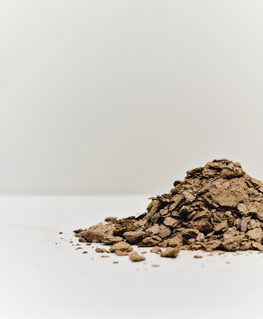Turning waste into furniture
At Mater, we continually strive to push the boundaries of traditional furniture production and beliefs.
The world’s take-make-waste economy consumes 100 billion tonnes of materials a year. Today only 7.2% of this is recycled.
Using the world’s raw materials to make products that eventually will be thrown away as waste is not a long-lasting solution.
Much of this waste ends up in landfills or incinerators, lost forever and contributing to the world’s accelerating CO2 emission.
Our planet’s resources are not infinite, and we need to change this way of production now.
Using waste material, Mater combines sustainability and
circular production with timeless design.

Waste streams we use

Grohe surplus plastic
Industrial plastic leftover from the production of flush bottoms for toilets. Industrial plastic is an excellent source of quality plastic that can be reused for furniture production.
Coffee shell waste
Coffee shells are a byproduct of coffee roasting but collected they can be used as a strong fibre for our Matek® production.


Discarded fishing nets
Old fishing nets from the ocean are collected, washed, shredded and made into pellets that are also called green plastic. Ocean waste is used in our outdoor series and injection moulded chairs.
Used beer kegs from Carlsberg
Once empty, beer kegs are deflated, turned into granules and cast into the green slats our Ocean OC2 Collection is known for.

Sawdust waste
Sawdust from the production of wood furniture is used our Matek® material.


Post-consumer e-waste
Consists of mixed plastic from large electrical equipment, household appliances, displays, fridges, etc. Recycling End-of-Life Electronics conserve limited natural resources and reduce pollution of the environment.

Mango wood waste
A Mango tree is cut down every 7-15 years when the tree stops to bear fruit, and a new tree is planted. Harvesting the wood that was previously burnt or left to break down naturally provides sustainable furniture.
Arla surplus plastic
When producing the top of Arla school milk cartons plastic is injected into a molding form. This process creates bits of surplus plastic that we can reuse in our Matek® production.

"Every material we use is a tribute to sustainable thinking"
- Henrik Marstrand
Founder of Mater and Head of Circular Transformation


Through years of research and testing, we invented Matek.
The uniquely patented materials enable us to make furniture of waste materials by combining fibre with a binder. Coffee bean shells, extracted during the roasting process, are an example of fibre material. Sawdust from wood production is another. The binder material is made from plastic waste. The mix of materials results in a unique compound suitable for press moulding.
Since Matek can be processed again and again, we unhesitatingly offer to take the furniture back at the end of its life to recycle it into new furniture. The technology allows us to recycle waste with more efficiency, helping us reduce the world's CO2 emissions.
Click here to learn more about Matek®
